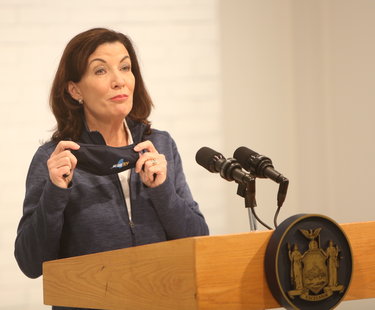Committee on Open Government calls for ‘overhaul’ of transparency practices in NYS
NEW YORK — New York State’s open-government laws aren’t working as well as they should and need to be changed, says the state’s own transparency watchdog.
In its 2024 annual report, the state’s Committee on Open Government lays out the various problems with the Freedom of Information Law and Open Meetings Law — the bedrock for government transparency in the state — and calls for a complete “overhaul” of the system.
“Over the last year, the Committee on Open Government (Committee) has continued to hear from hundreds of citizens who remain frustrated about persistent issues of compliance with the requirements of the Freedom of Information Law (FOIL) and Open Meetings Law (OML),” the committee says in the opening of the report.
Specifically, the committee highlights enforcement, efficiency, and clarity as major issues with the current laws.
As of now, the law only generally requires public agencies to complete requests within a “reasonable” amount of time — vague language that’s often abused.
For instance, a FOIL request The Enterprise submitted to the governor’s office in October was not formally rejected until February, being delayed each month as the office claimed it needed more time to complete the request, which was for a specific set of emails and other correspondence relating to the months-long lack of a quorum on the Berne Town Board.
There’s no way to speed up the process, as the laws’ enforcement mechanisms — an appeal or a lawsuit — both require that the request be completed first. Each of those methods adds a significant amount of time to the process, meaning that delaying the release of information is an easy tactic for officials hoping to keep public information private.
And lack of clarity in the laws, according to the Committee on Open Government, means that similar FOIL requests can be answered inconsistently across the state, with courts similarly issuing conflicting decisions about what’s open to the public and what’s not, particularly with regard to law-enforcement disciplinary records.
More oversight
To address some of the issues with the FOIL process, the committee has requested that the state provide additional oversight.
“The Committee once again urges reform of the system for oversight of agency compliance with FOIL and OML obligations,” the report states. “As described in past reports, the current statutory construct for appeal and enforcement imposes an expensive and time-consuming burden on citizens seeking redress for violations of the open-government statutes.
“This Committee itself has no enforcement powers but is keenly aware of the need for a more efficient and inexpensive way to process and resolve compliance disputes. One of the most frequently received complaints the Committee hears from individuals concerns the absence of an enforcement mechanism for these laws that is accessible to the average citizen.”
It goes on to highlight seven bills that have been introduced in the state legislature that would go some way to fix the enforcement gaps.
One bill would ease the requirements a petitioner must meet when suing over a FOIL request to have their attorney fees covered. Currently, the law requires that the petitioner “substantially prevail” in their suit, while the bill would remove the word “substantially” so that a simple victory is enough, potentially serving as a disincentive for denying FOIL requests.
Another bill would make it possible to impose other fees if a FOIL is wrongly denied or exceeds the reasonable time requirements.
With regard to appeals, one bill would have the Committee on Open Government serve as the FOIL appeals body, rather than the head of an agency or a governing board. While this bill would resolve conflict-of-interest concerns, the committee says that it doesn’t have enough staff to handle appeals, and does not offer an alternate solution.
A similar bill would “transform the Committee on Open Government into a hearings office, requiring the Committee to conduct investigations, conduct hearings regarding claims of denial of access under FOIL and violations of the OML, and order remedies,” the committee states, and would also give the committee the authority to hire additional staff for the purpose.
Two bills would impose training requirements of certain public officials while another would enshrine the right to public information in the state’s constitution.
However, “While the concept of a constitutional declaration concerning access to public information is laudable and non-controversial, the Committee believes that the legislative solutions discussed herein that provide concrete assistance and clarification of the current law are more likely to resolve persistent issues of noncompliance with law,” the committee says.
The committee says it does not support a bill that would impose criminal penalties on any FOIL officer for failure to perform their duties.
Data collection
The committee has also proposed that FOIL officers be required to submit additional FOIL data to the committee. The committee currently receives appeals decisions and will weigh in on these decisions where useful, but the committee says it would like to also receive the number of requests an agency receives, average response time, and outcomes.
A bill introduced in 2024 would require that agencies meet the committee’s reporting requirements, though the committee advises, in light of inadequate resources, that the data be posted publicly rather than processed and analyzed by the committee.
Proactive disclosures
One of the most major proposals from the committee is for proactive disclosures, which would circumvent the FOIL process entirely.
“Several bills … have been introduced this term that seek to advance this goal to varying degrees, but none has been adopted,” the committee says. “The Committee urges the Legislature to be thoughtful and deliberate in the crafting of this legislation, with an eye toward avoiding vague language and implementation delays that will frustrate its purpose, while also keeping in mind the administrative and financial realities faced by agencies.”
One bill that’s been introduced would have the committee study proactive disclosures as a solution, though, again, limited resources is an obstacle, the committee says.
“There are several other bills requiring agencies to post particular types of records,” it says. “S3574A/A2507A expands the requirement that the Commission on Ethics and Lobbying in Government post financial disclosure statements to include candidates for statewide office or a candidate for a member of the Legislature.
“S1571/A7739 requires the Ethics Commission for the Unified Court System to post financial disclosure statements of state-paid judges and justices, without regard to annual compensation amount, and none of the information may be deleted except upon individual determination by the Commission.”
Clarifications
One of the most complicated aspects of FOIL currently pertains to the disclosure of law-enforcement disciplinary records, which became more accessible to the public in 2020, after a protective provision was repealed and allowances were put in place amid widespread public outcry around police brutality.
“The Committee previously identified two key concerns that arose in the aftermath of the repeal of Civil Rights Law § 50-a: (i) whether the repeal applies retroactively to records created before June 2020 and to former officers no longer employed by law enforcement agencies after June 2020; and (ii) whether unsubstantiated or pending complaints of misconduct can be withheld due to privacy concerns,” the committee explains. “Both issues have given rise to multiple lawsuits.”
The committee notes two bills that seek to define unfounded and unsubstantiated allegations of police misconduct, which are currently protected from the public, but do not require the release of those records. A third bill would undo the repeal that was made in 2020, which the committee says it does not support.
The committee also notes that it and the courts are generally at odds over the delaying of FOIL requests.
“The Committee has opined that a series of extensions providing progressively later dates by which an agency will respond to a FOIL request is inconsistent with the language and intent of FOIL, but New York courts by and large have not agreed,” it says.
Various bills set specific requirements and make failure to disclose records in a timely manner tantamount to a denial, and therefore appealable, but the committee warns that “tinkering with statutory deadlines will do little to effectively improve compliance times. The varying administrative and financial needs of agencies and the differing scope of requests make ‘one size fits all’ mandates unrealistic.”
The committee notably does not support a bill that would open up materials exchanged between public agencies and third-party consultants.
Interagency materials are currently protected under FOIL, except in limited cases, but a lawsuit attempted to argue that, if an outside consultant is not a public body, the FOIL exemption does not apply. This was struck down by the state’s highest court.
“For this conclusion, the Court of Appeals noted that ‘[i]t would make little sense to protect the deliberative process when such reports are prepared by agency employees yet deny this protection when reports are prepared for the same purpose by outside consultants retained by agencies,’” the committee summarizes.
“The Committee agrees with the reasoning of the Court of Appeals on this issue and accordingly the Committee does not support a current legislative proposal … to amend this provision.”
Outside critiques
A different watchdog organization that’s not affiliated with the state, the Coalition for Open Government, has criticized Governor Kathy Hochul for failing to address transparency issues in 2024 despite her promises.
For instance, she vetoed a bill that would have required the publication of certain contract summaries in order to shine more light on state spending, a decision that drew criticism from State Comptroller Thomas DiNapoli, who framed it as a disservice to the public.
The coalition also notes that Hochul signed a bill that requires public employees to be notified when their disciplinary records are disclosed, which it says undermines the effort to make law enforcement more accountable.
“New York was the last state in the country to pass an open meetings law, and its current transparency framework remains among the weakest,” the coalition says. “Unlike other states, New York lacks an independent body with the authority to enforce open government laws. Instead, individuals are forced to navigate costly and complex legal battles to address violations. There is still no legislation that mandates that the public has the right to address their elected officials at public meetings.”
The coalition goes on to support a constitutional amendment for government transparency, mandatory coverage of attorney fees, a hearing officer system, a public comment period mandate at all public meetings, and a livestreaming requirement.
“We ask Governor Hochul to deliver the transparent government she promised,” the coalition says. “Transparency should not just be a campaign slogan — it is the bedrock of democracy. It is time to stop ignoring the voices of frustrated citizens and take meaningful action to ensure that government truly operates for the people.”



